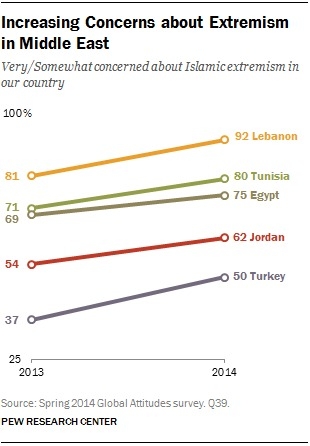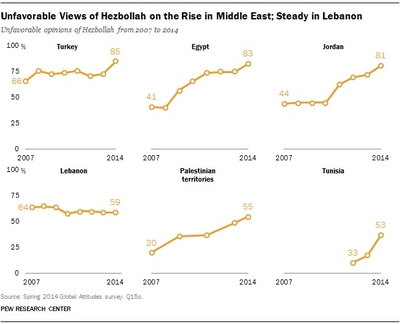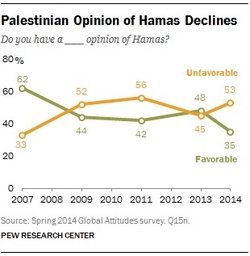Taj Hashmi
 JEWS and Christians ... should be forced to pay Jizya [poll tax] in order to put an end to their independence and supremacy so that they should not remain rulers and sovereigns in the land. These powers should be wrested from them by the followers of the true Faith [Islam], who should assume the sovereignty and lead others towards the Right Way. That is why the Islamic state offers them [non-Muslims] protection, if they agree to live as Zimmis by paying Jizya, …. it is the duty of the true Muslims to exert their utmost to bring an end to their wicked rule and bring them under a righteous order. Abul A'la Maududi, Founder of the Jamaat-e-Islami
The Muslim Brotherhood has not changed; only Western opinion of it has. As it was since its founding in 1928, the group is committed to empowering and spreading Sharia law -- a law that preaches hate for non-Muslim “infidels,” especially Islam's historic nemesis, Christianity, and allows anything, from lying to cheating, to make Islam supreme.Raymond Ibrahim, Middle East Forum, June 25, 2012
Overview: Muslim quest for alternative orders
JEWS and Christians ... should be forced to pay Jizya [poll tax] in order to put an end to their independence and supremacy so that they should not remain rulers and sovereigns in the land. These powers should be wrested from them by the followers of the true Faith [Islam], who should assume the sovereignty and lead others towards the Right Way. That is why the Islamic state offers them [non-Muslims] protection, if they agree to live as Zimmis by paying Jizya, …. it is the duty of the true Muslims to exert their utmost to bring an end to their wicked rule and bring them under a righteous order. Abul A'la Maududi, Founder of the Jamaat-e-Islami
The Muslim Brotherhood has not changed; only Western opinion of it has. As it was since its founding in 1928, the group is committed to empowering and spreading Sharia law -- a law that preaches hate for non-Muslim “infidels,” especially Islam's historic nemesis, Christianity, and allows anything, from lying to cheating, to make Islam supreme.Raymond Ibrahim, Middle East Forum, June 25, 2012
Overview: Muslim quest for alternative orders
American presidents from Eisenhower to Obama have been responsible for the phenomenal rise of Islamist forces throughout the Muslim World. Hillary Clinton and some top American diplomats and politicians have publicly admitted that the Cold War exigencies had led their country to support Islamist forces, including the Afghan Mujahedeen and those who later founded al-Qaeda. We also know that in 1953, while Eisenhower flirted with the ayatollahs on the eve of the CIA-led military coup that toppled a democratically elected government in Iran, both Carter and Reagan legitimised General Zia ul-Haq's pro-Jamaat-e-Islami Islamist military dictatorship in Pakistan (1977-1988). American leadership during Eisenhower and Nixon years preferred the Muslim Brotherhood (MB) to Nasser, for the latter's avowedly anti-Western and anti-Israeli stand, and his close ties with the Soviet Union. America continued to support the soft-on-Islam President Anwar Sadat and the MB till the killing of Sadat by Islamist radicals in 1981. Some critics of American foreign policy also portray the MB as an offshoot of the CIA. MB founder Hassan al-Banna's son-in-law Said Ramadan (father of Tariq Ramadan) is said to have been a CIA agent in the 1950s.i Many analysts believe that the Cold War understanding between America and Islamists -- the MB, Jamaat-e-Islami (JI) and Afghan Mujahedeen -- did not end with the end of the Cold War. They believe that MB leaders in Egypt and Syria, including Dr. Morsi, are pro-American.ii As a Western analyst puts in plain words, America and its allies are “funding, arming, while simultaneously fighting al-Qaeda from Mali to Syria” to serve their long-term geo-political interests in the Muslim World.iii In view of the controversial role America, Nato and its allies have been playing in the various conflict zones of “jihad” and “counter-jihad” in northwest and east Africa, Middle East and Afghanistan, one has reasons to believe that the West has been playing a dubious role. As for example, on the one hand we find top US leaders, Nato and ISAF commanders telling the world that they are fighting terrorists/insurgents in Afghanistan, and on the other, we find them acquiescing in to the public cultivation of poppy and narcotic trade in and beyond Afghanistan, which benefit drug lords, Taliban and al-Qaeda.
Irrespective of whether Mohamed Morsi and top MB leaders have had ties with America or not, the ground reality is that the average Egyptian Muslims do not favour either America or Israel. And thanks to decades of civil and military dictatorship (1952-2011), the Egyptians never had the exposure to liberal democracy and human rights. Thus, for the bulk of Egyptian Muslims, Islamism or political Islam has emerged as the main alternative to military dictatorship, and as the most powerful ideology to ensure civil liberty and human rights. However, as we know from people's experience of living under Shiite and Sunni theocracies in countries like Saudi Arabia, Iran, and Afghanistan and to some extent, in Pakistan, Islamism never ensures civil liberty, human rights and democracy. In view of this, I am briefly introducing the MB, JI, al-Qaeda, Khomeinism/ Iranian Islamism, Taliban, Wahhabism and some minor Islamist outfits in the Muslim World to facilitate the understanding of the impending threat of militant Islam and “Muslim Democracies” in the Muslim World. Ominously, Muslim majority countries -- from West Africa to North Africa, and the Middle East to South and Southeast Asia -- have been going through turbulent phase of their history and on the threshold of big transitions towards modernism and good governance (if not democracy) in the post-Cold War era of Globalization and the promised “New World Order.”
The level of support for Islamism varies from country to country. Islamist organisations and movements like the Muslim Brotherhood and Wahhabism flourish better in countries lacking in political freedom and democratic institutions than in free and democratic countries. Islamist organisations-cum-movements, such as the MB and Wahhabism, fill in the political and cultural space in countries without political parties and secular socio-cultural associations and institutions. Thus Islamist organisations are well entrenched throughout North Africa and Middle East. Although relative political and cultural freedom in Pakistan (even under military dictators) have allowed the proliferation of non-Islamic (if not totally secular) political parties and cultural organisations, yet Islam being the raison d'être for the creation of the state has special political importance in the country. Islamism has lesser space in the political arena of Bangladesh as the country emerged out of Pakistan in the name of secular Bengali nationalism, which was a departure from Islam-based state ideology of Pakistan.
Far from being united under a common banner, the Muslim militants are least capable of challenging Western hegemony. Again, they have more intra-Muslim conflicts to sort out before they can pose any substantial threat to Western civilisation. As there are “flashpoints” so are there “dormant volcanoes” in the Muslim World. Most importantly, Islamists proliferate under autocratic regimes, which by default or design promote Islamism. Examples abound. While Saudi Arabia promotes Wahhabi Islam as the state ideology to legitimise Saudi autocracy, military dictators in Pakistan and Bangladesh legitimised Islamism (although not the militant version of it) in league with “Islam-loving” politicians and clerics to legitimise military rule. Islamism flourished by default in countries like Egypt and Iran, where disgruntled Muslims and the relatively free (and influential) clerics clung to Islamism for an alternative order. This explains the rise of the MB and Khomeini.
Muslim Brotherhood (MB)
The understanding of Islamist “flashpoints” of “global jihad” requires an understanding of major Islamist movements, their brief history, ideologies and strategies. We may begin with the MB or Ikhwanul Muslemeen, the most prominent Islamist party in the world, which may be considered as “the mother of al-Qaeda.” It had a humble beginning. Hassan al-Banna (1906-1949), son of an imam and mosque teacher in Cairo, used to repair watches, and having interest in Islamic traditions wrote books on Islam. In March 1928, the 22-year-old Banna founded the Society for Muslim Brothers and within ten years it drew 500,000 Egyptians as active members. By 1945 the figure rose to two million. Thanks to 9/11 al-Qaeda seems to have stolen the thunder, while the MB remains the most organised and largest transnational Islamist organisation in the world.

American presidents from Eisenhower to Obama have been responsible for the phenomenal rise of Islamist forces throughout the Muslim World. Hillary Clinton and some top American diplomats and politicians have publicly admitted that the Cold War exigencies had led their country to support Islamist forces, including the Afghan Mujahedeen and those who later founded al-Qaeda. We also know that in 1953, while Eisenhower flirted with the ayatollahs on the eve of the CIA-led military coup that toppled a democratically elected government in Iran, both Carter and Reagan legitimised General Zia ul-Haq's pro-Jamaat-e-Islami Islamist military dictatorship in Pakistan (1977-1988). American leadership during Eisenhower and Nixon years preferred the Muslim Brotherhood (MB) to Nasser, for the latter's avowedly anti-Western and anti-Israeli stand, and his close ties with the Soviet Union. America continued to support the soft-on-Islam President Anwar Sadat and the MB till the killing of Sadat by Islamist radicals in 1981. Some critics of American foreign policy also portray the MB as an offshoot of the CIA. MB founder Hassan al-Banna's son-in-law Said Ramadan (father of Tariq Ramadan) is said to have been a CIA agent in the 1950s.i Many analysts believe that the Cold War understanding between America and Islamists -- the MB, Jamaat-e-Islami (JI) and Afghan Mujahedeen -- did not end with the end of the Cold War. They believe that MB leaders in Egypt and Syria, including Dr. Morsi, are pro-American.ii As a Western analyst puts in plain words, America and its allies are “funding, arming, while simultaneously fighting al-Qaeda from Mali to Syria” to serve their long-term geo-political interests in the Muslim World.iii In view of the controversial role America, Nato and its allies have been playing in the various conflict zones of “jihad” and “counter-jihad” in northwest and east Africa, Middle East and Afghanistan, one has reasons to believe that the West has been playing a dubious role. As for example, on the one hand we find top US leaders, Nato and ISAF commanders telling the world that they are fighting terrorists/insurgents in Afghanistan, and on the other, we find them acquiescing in to the public cultivation of poppy and narcotic trade in and beyond Afghanistan, which benefit drug lords, Taliban and al-Qaeda.
The understanding of Islamist “flashpoints” of “global jihad” requires an understanding of major Islamist movements, their brief history, ideologies and strategies. We may begin with the MB or Ikhwanul Muslemeen, the most prominent Islamist party in the world, which may be considered as “the mother of al-Qaeda.” It had a humble beginning. Hassan al-Banna (1906-1949), son of an imam and mosque teacher in Cairo, used to repair watches, and having interest in Islamic traditions wrote books on Islam. In March 1928, the 22-year-old Banna founded the Society for Muslim Brothers and within ten years it drew 500,000 Egyptians as active members. By 1945 the figure rose to two million. Thanks to 9/11 al-Qaeda seems to have stolen the thunder, while the MB remains the most organised and largest transnational Islamist organisation in the world.














